FREQUENTLY ASKED QUESTIONS
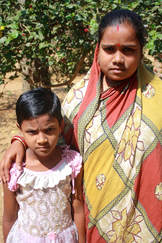
How do you select the children that are accepted into the WFF Sponsorship program in India?
According to UNESCO over 25 million children in India have been orphaned or lost one parent. The plight of single mothers left with multiple children is desperate. Most of our children come from single mothers with the mothers themselves asking that their child or children (we often have brothers and sisters) to be admitted to the school. Often these mothers are illiterate and have no way to support the children's education except by poorly paid manual labor. These children are the poorest of the poor, and tragically there are hundreds of these children without hope for a good education unless someone opens their hearts to them.
How much of my money actually goes to the children?
WFF is an all volunteer organization with over 90% of the funds going directly into programs to support the children.
What is the US tax-exempt status of World Family Foundation (WFF)?
WFF is a 501(c)(3) tax exempt organization. US Federal Tax ID# 27-0007430.
According to UNESCO over 25 million children in India have been orphaned or lost one parent. The plight of single mothers left with multiple children is desperate. Most of our children come from single mothers with the mothers themselves asking that their child or children (we often have brothers and sisters) to be admitted to the school. Often these mothers are illiterate and have no way to support the children's education except by poorly paid manual labor. These children are the poorest of the poor, and tragically there are hundreds of these children without hope for a good education unless someone opens their hearts to them.
How much of my money actually goes to the children?
WFF is an all volunteer organization with over 90% of the funds going directly into programs to support the children.
What is the US tax-exempt status of World Family Foundation (WFF)?
WFF is a 501(c)(3) tax exempt organization. US Federal Tax ID# 27-0007430.
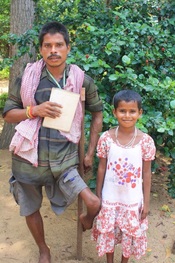
Why so much focus on education?
According to UNESCO the state of Odisha has the highest percentage of out-of-school children between ages six and 14 in India. In Odisha about 40 per cent of boys and girls do not complete eighth grade, and this is especially true in the rural village areas. The goal of WFF and Prashanti International School is to help break the cycle of poverty for these children through education. WFF believes that education for both boys and girls is the key to breaking the cycle of poverty that prevents these children from reaching their potential. We are committed to supporting our children to the highest academic level they are capable of achieving.
Do you provide higher education for girls as well as boys?
Yes, we strongly believe in education for girls. We count among our achievements, the fact the WFF sponsors have supported a number of our sponsored young people through college and professional training like nursing, IT, etc., including several young women! It’s hard for those of us from western countries to realize how much these young women have had to overcome to achieve this level of academics. When we invest in the education of young girls, it impacts not just their own lives, but also the lives of their children, families and communities for generations to come. Some will choose to work outside the home, and some will marry and be able to help their families in many other ways. Educated girls often have healthier children, and they understand the value of making sure their children also get a good education. We can help break the cycle of poverty by ensuring that girls have equal access to educational opportunities.
According to UNESCO the state of Odisha has the highest percentage of out-of-school children between ages six and 14 in India. In Odisha about 40 per cent of boys and girls do not complete eighth grade, and this is especially true in the rural village areas. The goal of WFF and Prashanti International School is to help break the cycle of poverty for these children through education. WFF believes that education for both boys and girls is the key to breaking the cycle of poverty that prevents these children from reaching their potential. We are committed to supporting our children to the highest academic level they are capable of achieving.
Do you provide higher education for girls as well as boys?
Yes, we strongly believe in education for girls. We count among our achievements, the fact the WFF sponsors have supported a number of our sponsored young people through college and professional training like nursing, IT, etc., including several young women! It’s hard for those of us from western countries to realize how much these young women have had to overcome to achieve this level of academics. When we invest in the education of young girls, it impacts not just their own lives, but also the lives of their children, families and communities for generations to come. Some will choose to work outside the home, and some will marry and be able to help their families in many other ways. Educated girls often have healthier children, and they understand the value of making sure their children also get a good education. We can help break the cycle of poverty by ensuring that girls have equal access to educational opportunities.
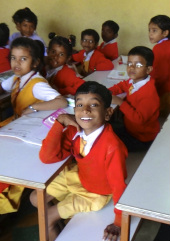
What is the difference between Prashanti School and Prashanti International School (PIS)?
Over time it became apparent that even with all the extra tutoring given to the residential children, they needed access to a better education than they were getting through the poor quality government schools in the area. We realized that if we were going to prepare these children for the future, they needed strong academics and fluency in English, so we decided to start our own day school. Land and buildings were purchased for Prashanti International School with funds donated by WFF. Prashanti International School was inaugurated in 2010 offering a well-rounded academic, values-based program with a focus on written and oral English language literacy, and including classes in the arts of their own cultural heritage. Our Prashanti School boarding students attend PIS, as well as children from local village families and the Puri area at a very low tuition. Both Prashanti School and PIS are registered non-profits in India.
Why is learning English so important for these kids?
The PIS academic program is an English immersion program. This means that English is included in the study of all subjects, as well as formal English instruction. In India, competency in the English language is a requirement for higher educational and work opportunities. All of the WFF sponsored residential kids are learning English well at PIS, and many even at the grade school level are already more fluent in English than high school students from the local government schools. This fluency will ensure that they will have an opportunity to be eligible for college and university level studies, and be able to pursue careers in teaching, medicine, IT, etc.
Over time it became apparent that even with all the extra tutoring given to the residential children, they needed access to a better education than they were getting through the poor quality government schools in the area. We realized that if we were going to prepare these children for the future, they needed strong academics and fluency in English, so we decided to start our own day school. Land and buildings were purchased for Prashanti International School with funds donated by WFF. Prashanti International School was inaugurated in 2010 offering a well-rounded academic, values-based program with a focus on written and oral English language literacy, and including classes in the arts of their own cultural heritage. Our Prashanti School boarding students attend PIS, as well as children from local village families and the Puri area at a very low tuition. Both Prashanti School and PIS are registered non-profits in India.
Why is learning English so important for these kids?
The PIS academic program is an English immersion program. This means that English is included in the study of all subjects, as well as formal English instruction. In India, competency in the English language is a requirement for higher educational and work opportunities. All of the WFF sponsored residential kids are learning English well at PIS, and many even at the grade school level are already more fluent in English than high school students from the local government schools. This fluency will ensure that they will have an opportunity to be eligible for college and university level studies, and be able to pursue careers in teaching, medicine, IT, etc.
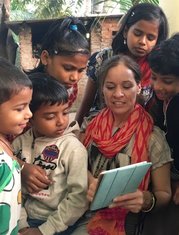
How important is sponsorship?
Sponsorships are the core of our program. Sponsors are assigned a child and they make a commitment to pay either the child's living expenses and/or the school fees each year. This in turn allows WFF to fund the living expenses and pay the school fees for the children. Remember many of these children have practically nothing and WFF provides the funding for all their needs: food, housing, clothing, medical care, school tuition, school uniforms, books and supplies, tutors, and cultural studies, such as music, dance, art, etc .
Do you have multiple sponsors per child?
Yes, in order to cover the basic living and school expenses, we must have more than one sponsor per child. We want to give as many people possible an opportunity to share in this heart centered work, and most importantly we want to support as many children as possible, even in the face of rising costs for food, teacher salaries, etc. WFF has found the most reliable and successful way to do this is by keeping sponsorships affordable, and financially within reach of as many people as possible.
Sponsorships are the core of our program. Sponsors are assigned a child and they make a commitment to pay either the child's living expenses and/or the school fees each year. This in turn allows WFF to fund the living expenses and pay the school fees for the children. Remember many of these children have practically nothing and WFF provides the funding for all their needs: food, housing, clothing, medical care, school tuition, school uniforms, books and supplies, tutors, and cultural studies, such as music, dance, art, etc .
Do you have multiple sponsors per child?
Yes, in order to cover the basic living and school expenses, we must have more than one sponsor per child. We want to give as many people possible an opportunity to share in this heart centered work, and most importantly we want to support as many children as possible, even in the face of rising costs for food, teacher salaries, etc. WFF has found the most reliable and successful way to do this is by keeping sponsorships affordable, and financially within reach of as many people as possible.

Do the children remain in the program until they are adults?
Most of the children will remain until they graduate from high school or college. Prashanti School is a registered non-profit in Puri, India for boarding students. WFF invests in helping these children overcome the academic handicaps of their background with additional tutoring and other help. WFF has been very successful, but unfortunately even with all the extra help, occasionally a student is not able pass to next the level academically. Due to government regulations, they then must leave Prashanti School, and we try to find the most appropriate situation for them.
How do I know when my sponsorship contribution is due?
We send out a reminder notice the first of the month the sponsorship contribution is due.
Do you also accept donations?
Our donors are an integral part of WFF. Donations pay for emergency expenses and extras that are not covered under the sponsorships. Both sponsorships and donations are essential for a stable and successful program.
Most of the children will remain until they graduate from high school or college. Prashanti School is a registered non-profit in Puri, India for boarding students. WFF invests in helping these children overcome the academic handicaps of their background with additional tutoring and other help. WFF has been very successful, but unfortunately even with all the extra help, occasionally a student is not able pass to next the level academically. Due to government regulations, they then must leave Prashanti School, and we try to find the most appropriate situation for them.
How do I know when my sponsorship contribution is due?
We send out a reminder notice the first of the month the sponsorship contribution is due.
Do you also accept donations?
Our donors are an integral part of WFF. Donations pay for emergency expenses and extras that are not covered under the sponsorships. Both sponsorships and donations are essential for a stable and successful program.
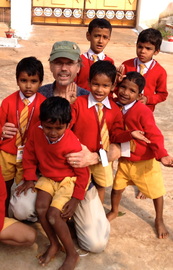
Do the sponsors have contact with their child?
Many sponsors enjoy keeping in contact with their sponsored child via email, although it is not a requirement for sponsorship. These children have had very little experience beyond their villages and the poverty of their lives. The interest and encouragement of the sponsor is invaluable and often makes the difference in the success of the child. Our sponsors are encouraged to keep an active communication with their child through emails and photos. Writing to a child and receiving communications in return is the heart of sponsorship and creates a loving bond and a sense of guardianship. It brings the sponsor into the child’s world and allows them to understand the tremendous value and importance of their involvement. In turn it broadens the lives of the children to learn about the sponsors' lives.
Over the years, several sponsors and friends of WFF have had an opportunity to visit the children in India and Sri Lanka in person. World Family Foundation recognizes this as a wonderful experience for both sponsor and child. However, any sponsor or donor planning such a visit must contact the Foundation for prior approval and for logistical assistance.
Do the children stay in contact with their families, villages and culture?
Yes, the children return home for school breaks. It is important for the children to maintain the bond to their families, villages and culture. We teach family values and encourage the children to give back to enrich their families and their communities when they graduate.
Many sponsors enjoy keeping in contact with their sponsored child via email, although it is not a requirement for sponsorship. These children have had very little experience beyond their villages and the poverty of their lives. The interest and encouragement of the sponsor is invaluable and often makes the difference in the success of the child. Our sponsors are encouraged to keep an active communication with their child through emails and photos. Writing to a child and receiving communications in return is the heart of sponsorship and creates a loving bond and a sense of guardianship. It brings the sponsor into the child’s world and allows them to understand the tremendous value and importance of their involvement. In turn it broadens the lives of the children to learn about the sponsors' lives.
Over the years, several sponsors and friends of WFF have had an opportunity to visit the children in India and Sri Lanka in person. World Family Foundation recognizes this as a wonderful experience for both sponsor and child. However, any sponsor or donor planning such a visit must contact the Foundation for prior approval and for logistical assistance.
Do the children stay in contact with their families, villages and culture?
Yes, the children return home for school breaks. It is important for the children to maintain the bond to their families, villages and culture. We teach family values and encourage the children to give back to enrich their families and their communities when they graduate.